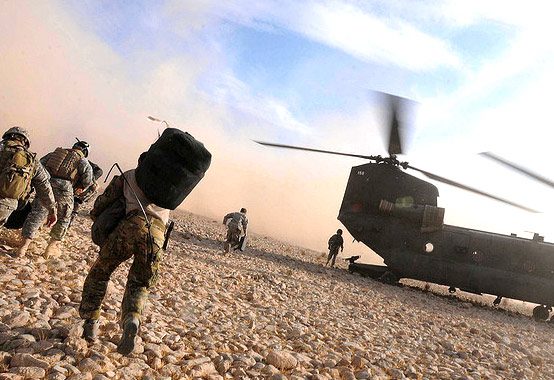Military Power Is Not a Foreign Policy Panacea

A recent article by Max Boot of the Council on Foreign Relations serves to illustrate how some elite thinkers in the United States have come to view the application of deadly force as a cure-all for a wide range of foreign policy challenges. In the February 10 edition of the Financial Times, he wrote that it was the U.S. failure to “arm and train the Free Syrian Army” that allowed the Syrian regime to stay in power. To counter perceived American inaction, he recommended solutions ranging from “doing more to arm the moderate opposition, to declaring a no-fly zone. Drones could strike al-Qaeda operatives in Syria; air power could create humanitarian zones near the Turkish and Jordanian borders.” While Mr. Boot castigates the White House for “inaction,” he does not bother to address the most critical question: what happens after these steps are taken?
For example, he argued we should train and arm “the Free Syrian Army.” Yet as has been widely reported, this so-called ‘army’ is a fractious, incongruous alignment of disparate groups, many of whose goals are antithetical to American interests and who often fight among themselves as often as against regime forces. Moreover, he does not address how these individual actions fit into a comprehensive strategy. How does he imagine the U.S. will identify al-Qaeda operatives within Syria for drone strikes? What end would these drone strikes seek to achieve? Kill “some” of the leaders? 10 percent? 50 percent? What would be the strategic utility of such a course of action? Given that nearly unfettered drone strikes have proven inconsequential in Pakistan and Yemen, how will sporadic strikes in Syria change the tactical balance?
Perhaps most importantly, advocates of military action frequently fail to consider this possibility: what sort of Syria would exist if their suggested military actions succeeded and the current Syrian regime did fall? What would be the likelihood that the grudging cooperation currently at play between radical and moderate Islamic groups on the rebel side would erupt into open warfare in the struggle for control of a post-Assad Syria? What would the United States do if an al-Qaeda affiliated coalition gained control of the Syrian state? These are hardly hypothetical possibilities.
Yet the default position by opinion leaders like Mr. Boot is to use military power first, and worry about the consequences later; the effects suffered by the men and women who live in the target country seem to get little consideration. As bad as the situation in Syria is today—and it is an unmitigated humanitarian nightmare—the application of American military power in the absence of a realistic and attainable strategy could make it worse. It is instructive to note that the U.S. military operations that were actually conducted in Libya in October 2011 were very similar to what Mr. Boot suggests for Syria, yet as Reuters reported on March 7, even “two-and-a-half years after the fall of former leader Muammar Gaddafi, the oil-rich North African state is struggling to contain violence between rival forces, with Islamist militants gaining an ever-stronger grip on the south of the country.”
Whether it’s a deteriorating situation in Venezuela, foreign troops in Crimea, warring tribes in Africa, or a deteriorating situation in Pakistan, the use of U.S. military power is often the worst response for both American interests and those of the foreign population. Highly complex and volatile situations frequently don’t require the application of violence to solve.
The American people have a right to expect that their government will protect their physical security and shepherd their economic interests worldwide. The government has an obligation to safeguard these interests in the most effective way possible. There are unquestionably occasions when the application of lethal military force is necessary to protect the American people, and I strongly affirm this right and obligation. But I just as strongly argue that the reflexive application of military power without first having weighed carefully the potential consequences—or without first having expended considerable efforts to find non-violent solutions—can work against American self-interest.
The opinions in this article are those of the authors alone, and do not reflect the views of Department of Defense or the U.S. Army. Daniel L. Davis is a Lt. Col in the U.S. Army, has been deployed four time to combat zones, was awarded the Bronze Star Medal for Valor in Desert Storm, and currently serves in the Washington, D.C. area.
Comments